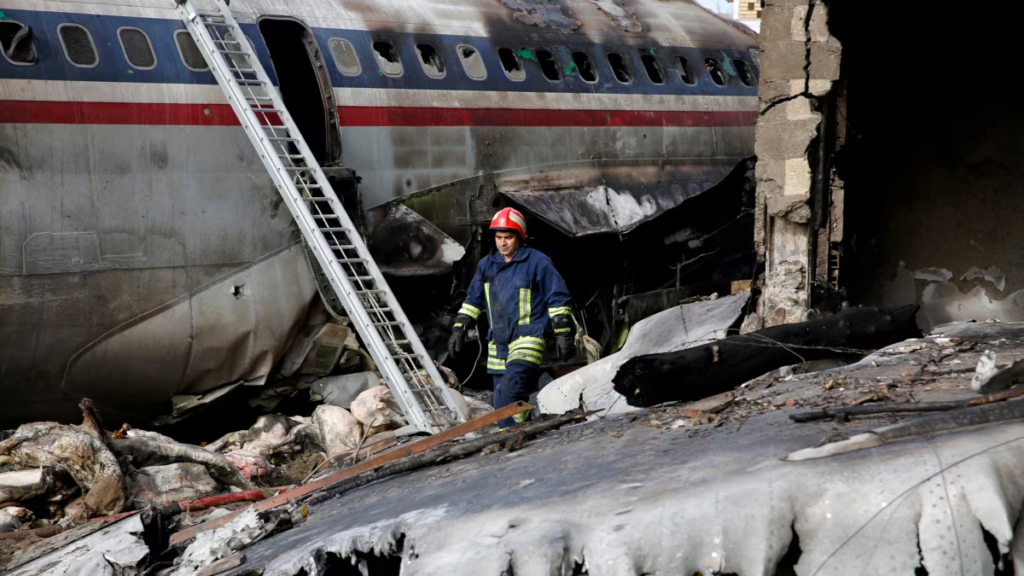Iran cargo flight was forced to change course mid-air after suspicions arose regarding its payload. The aircraft, bound for Lebanon or Syria, allegedly carrying weapons intended for Hezbollah, was turned back in Iraqi airspace. This incident marks a significant event in the ongoing tensions between Israel, Hezbollah, and Iran.
The Iran cargo flight was monitored closely, particularly after intelligence suggested it might be transporting military supplies to the Iran-backed terrorist group Hezbollah, escalating concerns in the region.
The Qeshm Fars Air, reportedly an airline with links to Iran’s military, took off from Tehran with its trajectory aimed at either Syria or Lebanon. However, this Iran cargo flight made a sharp U-turn in mid-flight following a warning issued by the Israel Defense Forces (IDF).
Read : Israel a Vampire Regime, US is Rabid Dog: Iranian Supreme Leader Khamenei
According to data from flight tracking websites, the Israel Defense Forces suspected the aircraft of carrying weaponry, likely intended to arm Hezbollah fighters in Lebanon.
Hezbollah’s Role and the Suspicious Iran Cargo Flight
Hezbollah, a powerful Iran-backed militant group based in Lebanon, has been a key player in the regional conflict, often clashing with Israel. The possibility of an Iran cargo flight delivering arms to Hezbollah has heightened tensions further. Israel has accused Hezbollah of using these arms in its ongoing struggle against Israeli forces.
Read : Satellite Photos Show Iran Expanding Missile Production: Assessed by American Researchers
Hezbollah has long been supported by Iran, with arms shipments forming a critical part of that support, allowing the group to maintain and expand its military capabilities. This makes the suspicions surrounding the Iran cargo flight even more significant.

Earlier this week, Lebanon’s transport ministry had already warned an Iranian aircraft not to enter its airspace after receiving threats from Israel. Israel had made it clear that any attempts to allow Iranian aircraft carrying weapons to land in Lebanon would be met with military force.
The warning from the Israel Defense Forces regarding this particular Iran cargo flight followed suit, pressuring the aircraft to retreat before reaching its suspected destination.
Israeli Strikes and Escalating Tensions
While the Iran cargo flight retreated, the conflict on the ground between Israel and Hezbollah has been intensifying. On Saturday, Israel launched a series of airstrikes targeting Hezbollah fighters, including an attack on a mosque in southern Lebanon.
These strikes are part of Israel’s broader campaign to destabilize Hezbollah’s stronghold in Lebanon. Since September 23, Israel has carried out a series of intensified airstrikes on Hezbollah positions, resulting in the deaths of over 1,110 people, according to reports.
Hezbollah responded to these airstrikes by engaging Israeli forces on the ground. The group’s fighters, often well-armed, possibly with equipment supplied through previous Iran cargo flights, have been clashing with Israeli troops along Lebanon’s southern border.
In recent reports, Hezbollah claimed that their fighters had forced Israeli soldiers to retreat in some areas, though the situation remains volatile.

At the same time, the Israel Defense Forces confirmed that they had targeted militants from Hezbollah near the border, with one significant strike hitting a mosque in the southern region of Lebanon.
As Israeli airstrikes continue to hit Hezbollah positions, the possibility of more Iran cargo flights attempting to resupply Hezbollah with weapons remains a concern for Israeli defense forces.
Regional Impact of the Iran Cargo Flight Incident
The situation surrounding the Iran cargo flight is part of a broader geopolitical struggle involving Iran, Hezbollah, and Israel. Iran’s continued support for Hezbollah, particularly through arms shipments like the one suspected aboard the Iran cargo flight, remains a major point of contention.
This incident reflects the wider conflict, with Israel maintaining a strict policy against allowing Iranian arms to reach Hezbollah fighters in Lebanon.
The turning back of this Iran cargo flight has broader implications for the region as well. Iraq, caught in the middle of this tension, allowed Israeli airspace access over its territory, demonstrating the delicate balance of power in the region. Meanwhile, the Lebanon-Israel border continues to witness clashes between Hezbollah fighters and Israeli troops, as the war of attrition rages on.
Moreover, the fact that the aircraft was forced to retreat reflects Israel’s ongoing strategy to prevent any military supplies from reaching Hezbollah via air. Such Iran cargo flights have been under scrutiny for years, often suspected of carrying everything from conventional arms to more sophisticated weaponry designed to enhance Hezbollah’s military reach.
In the midst of these escalating tensions, news emerged that Hezbollah’s senior leader, Hashem Safieddine, who is being groomed as a possible successor to Hassan Nasrallah, the current head of Hezbollah, has been missing in action since an Israeli airstrike targeted an underground bunker in Beirut. This incident, coupled with the Iran cargo flight’s suspicious payload, has only added to the tension.

Though there has been no official confirmation from Hezbollah regarding Safieddine’s status, his disappearance further intensifies the situation. Hezbollah remains a highly structured and secretive organization, and any disruption in its leadership, especially during times of increased conflict, can have ripple effects on the group’s operations.
Meanwhile, Israel’s military is maintaining its aggressive stance, with continued strikes on Hezbollah’s positions. The suspected Iran cargo flight carrying weapons could have significantly altered the balance of power, especially in light of Israel’s ongoing military operations aimed at weakening Hezbollah’s strongholds.
By turning back the Iran cargo flight, Israel may have thwarted a potential resupply mission, which could have fortified Hezbollah’s defense against Israel’s relentless airstrikes.
In conclusion, the incident involving the Iran cargo flight is a crucial episode in the broader context of the Israel-Hezbollah conflict. The ongoing clashes along the Lebanon-Israel border, combined with the Israeli airstrikes targeting Hezbollah, have set the stage for a prolonged conflict.
Meanwhile, Iran’s role in supplying Hezbollah with military equipment, possibly through Iran cargo flights, continues to be a key factor in the regional instability. Israel remains vigilant, and any future attempts by Iran to deliver arms to Hezbollah, whether by land or air, are likely to face similar resistance.

